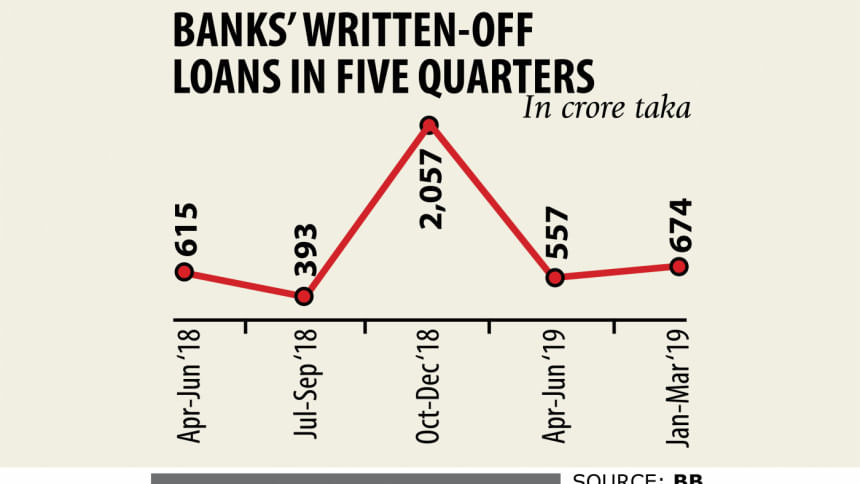Written-off loans rise in Q2

Loans written off by banks surged 21 percent to Tk 54,463 crore in the second quarter of the year from a quarter ago as the lenders try to clean up balance sheets and paint a rosy picture of their health.
As much as Tk 674.38 crore was written-off between April and June, in contrast to Tk 557.30 crore a quarter ago, according to latest data from the Bangladesh Bank.
The central bank has recently eased its write-off policy, which has encouraged banks to tidy up the balance sheet artificially, said experts.
In February, the BB revised the policy to allow banks to write off default loans that have been languishing in the bad category for three years, down from five years previously.
Furthermore, lenders do not have to file any case with money loan courts to write off delinquent loans worth Tk 2 lakh, up from Tk 50,000 previously.
Banks have failed to recover 76 percent of the total written-off loans since January 2003 when the central bank introduced the policy.
This means the unrecovered delinquent loans stood at Tk 41,177 crore as of June.
"The written-off loans have gone up in recent months because of the central bank's relaxed policy," said Salehuddin Ahmed, a former governor of the central bank.
Many lenders are now showing unwillingness to recoup default loans by initiating all-out efforts, he said.
The write-off policy has become one of the pivotal avenues for banks to show a lower volume of non-performing loans, he said.
"The central bank has also provoked lenders to do so. But this will not help strengthen the financial health of the banking sector," Ahmed said.
The former governor said there has been many knock-on effects in the sector for the upward trend of the written-off loans as lenders could not realise the loans in most cases.
He said the central bank has recently announced to provide liquidity support to the banking sector, but it is not good for the economy as many lenders are already burdened with NPLs.
The central bank should refrain from extending such support in the greater interest of the banking sector, he said.
The large volume of default loans has forced banks to write off the default loans, said Khondker Ibrahim Khaled, a former deputy governor of the central bank.
Khaled, however, sees a positive aspect in the policy, as banks have to keep 100 percent provisioning against the written off loans.
Defaulted loans stood at Tk 112,425 crore in June, up 19.71 percent from December last year.
Khaled advised banks to go all out to rein in the rise of default loans as it will go a long way to help them curb written-off loans.
Banks are compelled to write off loans when all options to recover the default loans are exhausted, said Syed Mahbubur Rahman, chairman of the Association of Bankers, Bangladesh, a forum of the managing directors of private banks.
He says the write-off method is a globally recognised policy, so there has been no negative impact in the banking sector.

 For all latest news, follow The Daily Star's Google News channel.
For all latest news, follow The Daily Star's Google News channel. 



Comments